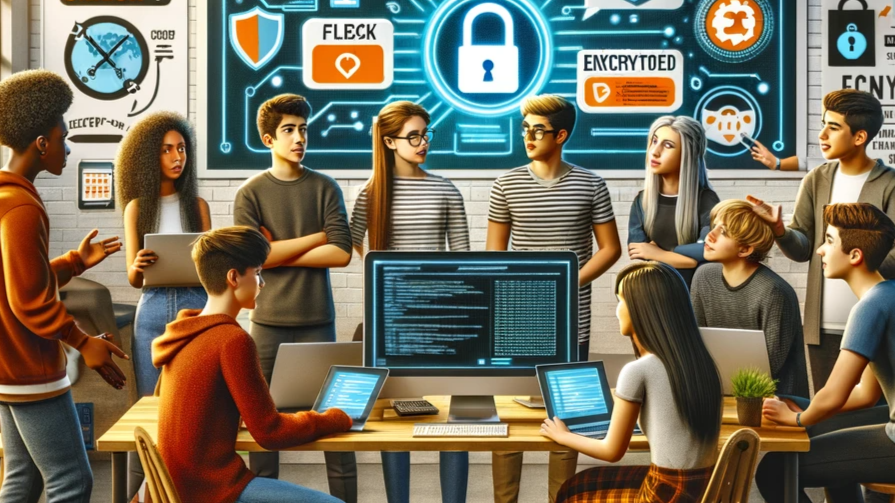Table of Contents
In today's rapidly evolving digital world, there's a pressing question for techie teens: What should teens care about cybersecurity? Well, picture this: you're surfing the web, connecting with friends on your favorite platforms, and conquering the digital universe one click at a time. It's an exhilarating age to be a teenager, right? But here's the plot twist: as you explore this boundless online realm, there's something precious you need to guard with all your might – your personal data. In an era where information is akin to gold, mastering the art of shielding yourself from lurking cyber threats and privacy intrusions is akin to possessing a superpower.
In this article, the importance, complexity, and topics related to cybersecurity will be discussed. Let's dive headfirst into the intriguing world of cybersecurity!
Why Is It Important To Learn About Cybersecurity?
Learning about cybersecurity is like giving yourself a superpower in the digital world, enabling you to protect your personal information, ward off cyber threats, and make the digital space safer for everyone.
Isn’t it wonderful ?
Let's examine it in detail.
- Protecting Personal Information: In today's world, where we store an increasing amount of personal and sensitive information online, including our financial data and personal identities, it's imperative that we grasp the art of safeguarding our data. This knowledge acts as a shield, preventing identity theft and financial setbacks.
- Safeguarding Digital Assets: As our reliance on digital devices and services continues to grow, we inevitably accumulate valuable digital possessions. Acquiring expertise in cybersecurity becomes our armor, shielding these digital assets from theft, harm, or unauthorized access.
- Preventing Cyberattacks: With cyberattacks evolving into more sophisticated and pervasive threats, understanding cybersecurity empowers us to identify and defend against various forms of attacks like phishing, malware, and ransomware.
- Ensuring Online Privacy: A grasp of cybersecurity equips us with the tools to take charge of our online privacy. We learn how to navigate privacy settings, manage what we share on the internet, and protect ourselves from unwanted surveillance.
- Career Opportunities: In an era where the demand for cybersecurity professionals is skyrocketing, gaining proficiency in this field not only opens doors to job opportunities but also charts a career path. This is especially valuable in a domain facing a shortage of skilled experts.
- Responsible Digital Citizenship: Being cyber-aware goes beyond self-protection; it's a cornerstone of responsible digital citizenship. It entails practicing ethical behavior, showing respect for the digital rights of others, and actively contributing to a safer online environment.
- Business and Organizational Needs: Many corporations and institutions now expect their employees to possess fundamental cybersecurity knowledge. This expertise enhances our employability and serves as a valuable asset in safeguarding sensitive company data and networks.
- National Security:Cybersecurity plays an irreplaceable role in national security. Those who grasp its intricacies can actively participate in the defense against cyber threats, which can have far-reaching implications at both the national and global levels.
In summary, a deep understanding of cybersecurity is essential for shielding our personal information, defending against cyberattacks, securing our online privacy, and advancing our careers. It also entails embracing the responsibilities of responsible digital citizenship and contributing to the broader realm of national security.
Is Cybersecurity Hard?
Have you ever wondered what makes cybersecurity such an exciting field? Well, think of it as solving a complex digital puzzle! It's like being a modern-day detective, exploring the vast online world for hidden clues and threats.
Imagine having the power to protect valuable information, prevent cyberattacks, and ensure online safety. Cybersecurity allows you to become a guardian of the digital realm, defending against cunning adversaries.
While it may seem challenging at first, it's also incredibly rewarding. You'll gain the skills to outsmart cybercriminals, safeguard your digital assets, and contribute to a safer online environment. So, is cybersecurity hard? Not when you embrace it as a thrilling puzzle waiting to be solved!
Cybersecurity Topics
What are the Cybersecurity topics?These topics encompass a wide range of issues that need to be addressed to ensure security in the digital world. These are important cybersecurity issues:
- Network Security: Protecting computer networks from unauthorized access, attacks, and intrusions.
- Data Encryption:The process of converting data into a code to prevent unauthorized access.
- Firewalls: Security systems that monitor and control incoming and outgoing network traffic.
- Malware:Malicious software, including viruses, ransomware, and spyware, designed to harm or gain unauthorized access to computer systems.
- Phishing: Deceptive emails and messages used to trick individuals into revealing sensitive information, such as passwords and financial details.
- Identity Theft: Unauthorized use of someone's personal information, often for financial gain.
- Cyber Hygiene: Best practices and habits for staying safe online, such as regularly updating software and using strong, unique passwords.
- Social Engineering:Manipulating individuals into divulging confidential information through psychological tactics.
- Incident Response: Strategies and procedures for managing and mitigating the impact of cybersecurity incidents.
- Secure Coding: Writing software with security considerations to prevent vulnerabilities and exploits.
- Cloud Security: Ensuring the security of data and applications stored in cloud environments.
- IoT Security: Protecting Internet of Things devices and networks from cyber threats.
- Biometric Security: Using unique physical or behavioral characteristics, like fingerprints or facial recognition, for authentication.
- Cyber Threat Intelligence: Gathering and analyzing information about potential cyber threats to preemptively defend against them.
- Regulatory Compliance:Ensuring that organizations adhere to legal and industry-specific cybersecurity regulations and standards.
- Cybersecurity Awareness Training: Educating individuals and employees about cybersecurity best practices.
- Zero Trust Security: A security model that trusts no one, even those inside the network, and requires continuous verification.
- Blockchain Security: Ensuring the security of blockchain-based systems and cryptocurrencies.
- Vulnerability Assessment: Identifying and addressing weaknesses in systems and applications that could be exploited by attackers.
- Mobile Device Security: Protecting smartphones and tablets from threats and unauthorized access.
These are just a few of the many cybersecurity topics that individuals and organizations should be aware of and actively address in today's digital landscape.
What is The Difference Between Cybersecurity and Network Security?
Cybersecurity protects your digital world from all online threats, while Network Security specifically guards the entry points, like a virtual gatekeeper!
Let's briefly uncover the secrets of Cyber Security and Network Security, the dynamic duo of the Internet world!
In a nutshell, Cybersecurity is the broader umbrella that encompasses all measures to safeguard your digital assets, including data, devices, and systems. On the other hand, Network Security focuses on fortifying the pathways and access points to ensure that only authorized users and safe data can flow through, acting as the frontline defender of your online domain. Together, they form an essential defense duo for a secure online environment.
In a world where technology is an integral part of our lives, understanding the significance of cybersecurity is paramount for teens. Picture this: you're navigating the vast digital landscape, connecting with friends, and exploring new horizons online. It's an exciting era to be a teenager, full of endless possibilities. However, amidst this digital adventure, there's something precious you need to protect, your personal data. In an age where information is as valuable as gold, mastering the art of cybersecurity is akin to having a superpower.
In this article, we've explored the importance of cybersecurity for teens, delving into its complexities and key topics. It's a journey that empowers you to safeguard your personal information, defend against cyber threats, and contribute to a safer digital world. So, embrace the digital age with confidence, armed with the knowledge of cybersecurity, a skill that not only protects you but also makes the online realm a better place for everyone!
FAQ
What Should StudentsCare About Cybersecurity?
Students should prioritize cybersecurity by using strong, unique passwords, being cautious about sharing personal information online, and avoiding suspicious downloads. They should also stay informed about the latest threats and practice safe online behavior to protect themselves from cyberattacks and maintain their digital privacy.
What is The Most Important Thing in CyberSecurity?
The most important thing in cybersecurity is proactive prevention. This involves staying updated on threats, using strong, unique passwords, enabling two-factor authentication, and regularly updating software. Additionally, educating employees and users about security best practices and fostering a security-aware culture are vital for safeguarding against cyber threats.
Is CyberSecurity a Threat to Students?
No! Cybersecurity itself is not a threat to students. Rather, it's a defense against online threats. However, students can be vulnerable to cyberattacks if they don't practice good online security habits. They should be cautious about sharing personal information, use strong passwords, and stay informed about online risks to protect themselves from potential threats.





